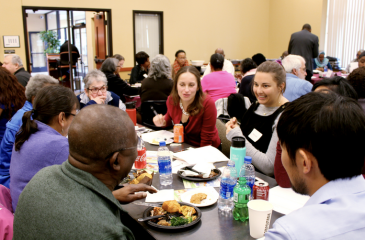In November, CTSI grantee Tetyana Shippee, PhD, Associate Professor in the Division of Health Policy and Management, shared preliminary results of her research on racial disparities in long-term care for older adults at a community forum, attended by approximately 100 community members and partners at the Urban Research and Outreach-Engagement Center (UROC). The research Dr. Shippee shared was supported by CTSI’s Community Health Connections award during its fifth cycle.
These preliminary results are from Dr. Shippee’s project, “Identifying and addressing racial disparities in long-term care.” This project is one portion of Dr. Shippee’s ongoing work in partnership with the Minnesota Department of Human Services and funded by the National Institute of Health.
The community forum was convened in partnership with the Minnesota Diverse Elders Coalition and planned by a community-based planning group of Diverse Elders Coalition members, in partnership with Dr Shippee. It was attended by members of multiple communities affected by disparities in long-term care quality for older adults. Hispanic and Latinx, Somali, Native American, and African-American communities were in the audience, as well as care providers from nonprofit and other organizations. Attendees also included participants in Dr. Shippee’s research projects who have contributed during interviews and focus groups and who want to remain involved on project updates. Professional translators simultaneously shared the presentation in Spanish and Somali. The program consisted of three panels: 1) a research panel with presentations from Dr. Shippee and her team member in the School of Public Health PhD student Odichinma Akosionu, 2) provider panel, with organizations that span a continuum of long-term services and supports and serve diverse consumers and 3) consumer panel, sharing their perspectives on finding and using long-term care as members of racially/ethnically diverse communities.
The Community Health Connections award, which helped support Dr. Shippee’s work on this project, focuses on dissemination or sharing information about research locally. These awards intend to give community partners an opportunity to learn about the progress of ongoing research projects and the results of completed projects. This small grant award seeks to address community research partner concerns from across the nation about how we can be more genuine in our engagement of communities in clinical and translational research. It is one of six funding opportunities through CTSI’s Community Engagement to Advance Research and Community Health (CEARCH) office that collectively support UMN and community research collaborations to generate and test research ideas with the goal of improving individual and community health.
CTSI’s support allowed Dr. Shippee and her team to disseminate their work to the communities affected and build meaningful partnerships with community organizations. It also provided funding for hosting meetings and building community capacity around addressing racial/ethnic disparities in long-term care.
While the five-year project is currently in its fourth year, Dr. Shippee and her team look forward to ensuring the statistics, data, and findings from their research are meaningfully disseminated upon completion to improve healthcare and quality of life for all Minnesotans in long-term care. Dr. Shippee is beginning a new study with the Department of Health looking into similar questions in other areas of long-term care: home- and community-based services.
To learn more about the impact of Dr. Shippee’s research and how it supports forming regulations, see the School of Public Health’s article on the assisted living licensure law.
To learn more about the Community Health Connections award and other community-engaged research funding opportunities, visit the CEARCH page on CTSI’s site.
